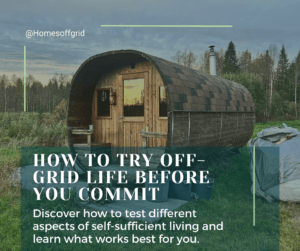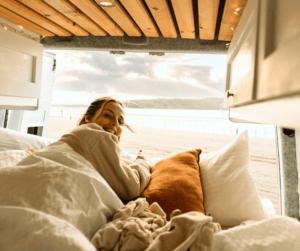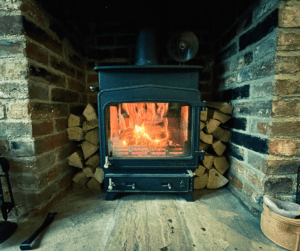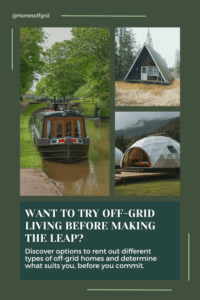The idea of off-grid living is deeply appealing. For many, it represents an escape from modern distractions, a chance to reconnect with nature, and an opportunity to become more self-sufficient. Whether it’s generating your own power, collecting rainwater, or growing your own food, the lifestyle can be both rewarding and liberating. However, making the transition to off-grid life is a significant step. While the concept is romanticised in many ways, the reality can be challenging – demanding practical skills, patience, and a willingness to adapt. This is why getting to try off-grid life before making a permanent commitment can be incredibly beneficial.
By spending time in an off-grid rented home – whether in a remote cabin, a live-aboard boat, or a campervan – you can experience the realities of self-sufficient living without the long-term investment. This allows you to test different aspects of the lifestyle, learn what works for you, and discover potential challenges before making any major decisions.
From short weekend stays to long-term rentals, there are many ways to try out off-grid life in a setting that suits your interests. Discover the different options for off-grid trial experiences, from secluded cabins in the UK to campervan rentals across Europe and eco-retreats worldwide. By taking the time to explore these options, you’ll gain valuable insight into what kind of off-grid setup best fits your needs – helping you make an informed decision about your future lifestyle.

Why Trying Off-Grid Life Is Valuable
Taking the time to try out off-grid life before making a long-term commitment can provide essential insight into what the lifestyle truly entails. There are many ways to live off-grid, from remote cabins and tiny homes to live-aboard boats and self-sufficient campervans. Each has its own unique challenges and benefits, and experiencing different setups firsthand can help you determine what suits you best.
One of the biggest advantages of trialling off-grid living is the opportunity to gain hands-on experience with essential systems. Many off-grid homes rely on solar power, rainwater collection, composting toilets, and alternative heating methods. By staying in an off-grid rental, you can familiarise yourself with these systems and develop a better understanding of how they function on a day-to-day basis. This practical experience can be invaluable when it comes to planning your own off-grid setup.
A trial stay also allows you to assess your comfort levels and personal needs. Living off-grid often means adapting to a simpler way of life – one that may include limited electricity, reliance on wood-burning stoves, or restricted water use. Some people thrive in this environment, while others may find it more challenging than expected. By spending time in an off-grid home, you can test different aspects of the lifestyle and identify what works for you before making a permanent move.
While renting an off-grid retreat can sometimes be costly, it may ultimately save you money in the long run. Investing in an off-grid home – whether it’s a boat, a van, or a piece of remote land – is a major decision. Trialling different setups first can prevent costly mistakes by helping you refine your vision and ensure you choose the right option for your needs.
Try Renting an Off-Grid Retreat in the UK
Renting off-grid accommodation in the UK allows you to experience different aspects of self-sufficient living in a low-commitment way. Whether you’re testing out an eco-cabin, a campervan, or a boat, each experience will provide practical experience with sustainable systems, and valuable insights into what works best for you. This will help you make informed decisions about your off-grid future.
Off-Grid Cabins and Properties
For a taste of stationary off-grid living, renting a self-sufficient property can give you insight into what it’s like to live without mains power, water, and heating systems. From woodland cabins to remote stone cottages and shepherd’s huts, the UK has a diverse range of off-grid accommodations to choose from.
- Canopy & Stars offers a wide selection of unique off-grid stays, including yurts, geodomes, and cabins. Their listings are personally visited and approved to ensure quality, making them a reliable choice if you want an authentic off-grid experience.
- Earth Stays focuses on sustainable accommodation, requiring all listed properties to meet specific environmental standards. Their website also features articles on some of their providers, offering further insight into eco-living practices.
- Unplugged caters to those seeking a full digital detox, providing instant-film cameras, old-school mobile phones, and lots of off-grid activities to encourage time away from screens. They also offer a helpful quiz to match you with the best accommodation for your needs.
Renting an off-grid property allows you to experience life with alternative energy sources, rainwater collection, composting toilets, and wood-fired heating, helping you determine which systems you’d be comfortable using in a long-term setup.
Campervan and Vehicle Rentals
If mobility appeals to you, hiring an off-grid campervan lets you experience life on the road while testing self-sufficient travel setups. A well-equipped campervan can provide solar power, water storage, and a compact living space, giving you a feel for off-grid van life.
- Quirky Campers offers an ‘off-grid’ filter, allowing you to choose vehicles with features like solar panels and composting toilets. With a vast range of styles and layouts, you can find a setup that suits your needs before committing to van ownership.
- Other companies across the UK also provide self-sufficient van rentals, but it’s important to check reviews and confirm details before booking to ensure the vehicle meets your expectations.
Renting a campervan can help you understand the challenges of off-grid vehicle living, including managing power, finding park-ups, and keeping warmth in colder months.

Live-Aboard Boats
Living off-grid on the water presents a unique experience, with challenges such as limited space, navigating waterways, and adapting to off-grid energy solutions. A short-term rental can help you determine whether boat life is a good fit.
- Waterways Holidays offers various boat rentals, from narrowboats to sailing yachts. You can choose specific canal networks and routes, allowing you to explore life on the water in a region of your choice.
- Small, independent companies like Bridgecraft Boatyard provide family-run rental services with a more personal touch.
- If you’re interested in a long-term trial, Long-Term Narrowboat Hire offers extended rental options, giving you a realistic experience of life on the canal before committing to boat ownership.
A live-aboard rental will give you an understanding of boat maintenance, power management, and the close-knit boating community, helping you decide if it’s a lifestyle you’d enjoy long-term.
Off-Grid Rental Options in Other Regions
Renting abroad is a great way to experience off-grid living while getting to know a new area – especially if you’re considering relocating. While many countries have their own rental companies, several well-known international platforms can help you try off-grid life before making a long-term commitment.
Renting Off-Grid Properties Abroad
If you want to immerse yourself in self-sufficient living in a different country, several platforms offer unique off-grid stays:
- Host Unusual features a collection of distinctive properties worldwide, with a dedicated ‘off-grid’ category to refine your search.
- Airbnb now includes an off-grid filter, making it easier to find properties that operate independently from conventional utilities.
- Nature House is a Europe-focused platform that allows you to filter properties based on sustainability criteria, such as whether they use 100% renewable energy, grow food on-site, or incorporate natural building materials.
Renting an off-grid home abroad gives you hands-on experience with different climates, local resources, and sustainable living practices, helping you determine what, and where, works best for you.
Global Camper Rental Options
If you prefer off-grid living on the road, renting a campervan can provide insight into mobile living across different terrains and climates.
- Indie Campers offers campervan rentals across Europe, the USA, and Australasia, making it a flexible option for international travel.
- CamperDays provides a variety of vehicle sizes and rental options, covering North America, Europe, and other popular regions.
- Bliss Mobil caters to those seeking a more rugged experience, offering 4×4 overland truck rentals for expeditions in locations like Iceland and Morocco.
Renting a camper abroad can help you test off-grid travel setups before investing in your own vehicle, giving you a better idea of power management, water storage, and vehicle capability in different environments.
Boat Rentals
If life on the water appeals to you, renting a boat can provide valuable insight into off-grid marine living. Whether you’re considering inland waterways or open-sea sailing, there are various rental options available:
- Boatsy and Samboat offer peer-to-peer rentals of all boat types, though it’s important to check reviews and verify listings to avoid scams.
- Sailing Europe is a yacht charter agency that helps travellers find the right boat for their sailing adventures.
Keep in mind that some rentals may require a skipper’s license or an additional fee for a professional skipper. This is especially important if you plan to take a boat out to sea rather than staying on inland waterways.

Renting an off-grid home abroad can be an invaluable way to test different setups and locations before committing to an off-grid lifestyle. Whether you’re looking for a short-term escape or a trial run for a future move, these options allow you to explore self-sufficient living in a variety of settings.
Short-Term vs. Long-Term Off-Grid Rentals
When considering an off-grid rental, the length of your stay can significantly impact your experience. Short-term stays provide a brief introduction to self-sufficient living, while long-term rentals offer a more immersive experience, helping you prepare for a potential permanent transition.
Short-Term Stays: A Taste of Off-Grid Living
A short-term rental, whether for a weekend getaway or a couple of weeks, is a great way to try off-grid life without committing to a permanent setup. This can be especially useful if you’re just starting to consider an off-grid lifestyle and want to experiment with different types of homes and locations.
Trying a variety of setups can help you decide what suits you best. Experience life in a strawbale house, earthbag home, or cob cottage to see how well these structures regulate temperature and blend with the environment. If you’re considering downsizing, renting a converted shipping container or a small off-grid cabin can help you assess whether compact living suits your needs. Meanwhile a campervan, RV, or yurt stay can give you insight into the flexibility of a nomadic off-grid lifestyle.
Short-term stays allow you to test different approaches without a long-term commitment. They also serve as a practical way to identify what comforts you’re willing to sacrifice and what aspects of off-grid life might require adaptation.
Long-Term Rentals: A Deeper Understanding
If you’re seriously considering an off-grid transition, a long-term rental can provide valuable first-hand experience of daily self-sufficient living. Staying for several months or even a year allows you to understand seasonal challenges, such as heating in winter, water collection during dry months, or food preservation. You will have the opportunity to get used to energy limitations, especially if relying on solar or wind power. There will be time to learn resource management, from maintaining composting toilets to sourcing off-grid fuel and food. Spend time in a specific type of off-grid home to ensure it fits your lifestyle before investing in one of your own.
Long-term rentals offer a realistic preview of daily life off-grid but they can be harder to find than short-term options. Consider speaking to accommodation owners to see if longer periods are possible. Another option is to try the alternative community forums in your area of choice. Whether you’re just curious or preparing for a permanent move, giving yourself the opportunity to try off-grid life, short- or long-term, can help you make informed decisions before committing to a lifestyle change.
Tips for Making the Most of Your Off-Grid Trial Experience
Spending time in an off-grid rental is a valuable opportunity to explore self-sufficient living and determine what aspects of the lifestyle suit you best. Whether you’re staying for a weekend or several months, approaching the experience with preparation and curiosity can make a significant difference.
Prepare for a Stay Without Modern Conveniences
Off-grid rentals often lack the luxuries of conventional homes, so it’s important to adjust your expectations. Depending on the setup, you may need to:
- Adapt to limited electricity, especially if solar or wind power is the only energy source.
- Rely on alternative water systems, such as rainwater collection or manual pumping.
- Use composting toilets instead of a traditional flushing system.
- Adjust to wood stoves or passive heating rather than central heating.
Before your stay, check what facilities are available and plan accordingly. Bringing power banks, rechargeable lights, and warm layers can help you stay comfortable.

Observe How Off-Grid Systems Work
A trial stay is the perfect time to learn about the practicalities of off-grid living. Pay close attention to:
- Energy use: How much solar power is generated daily, and how much is needed to run essential appliances?
- Water supply: How is water sourced, stored, and filtered? Does usage need to be carefully managed?
- Heating and cooling: Is insulation effective? What fuels or passive techniques are used for warmth?
- Food production and storage: Does the rental grow food, keep livestock, or use sustainable food preservation methods?
Taking note of what works well – and what feels challenging – can help you refine your plans for future off-grid living.
Document Your Experience
The more effort you put into documenting your stay, the more useful it will be when planning your next steps. Consider:
- Keeping a daily journal: Record what you find enjoyable, what feels difficult, and any unexpected challenges.
- Taking photos or videos: Visual documentation can help when researching different setups later.
- Recording voice notes: Useful for capturing thoughts on the go, especially when testing different systems.
These records will be invaluable when comparing different off-grid setups or deciding on a long-term living arrangement.
Ask Questions and Learn from Your Host
If your rental has a host with off-grid experience, take the opportunity to ask about:
- Energy systems: What works best for their location? Have they made any upgrades?
- Water management: How do they ensure a consistent supply? What filtration methods do they use?
- Sustainability practices: How do they handle waste? Do they grow food or raise animals?
- Challenges they’ve faced: What would they do differently if starting again?
Most off-grid homeowners have learned through trial and error, so their insights can help you avoid common pitfalls.
Conclusion
Taking the time to try out the off-grid life will provide you with invaluable insight into what self-sufficiency truly entails. Whether you’re just curious about the lifestyle or seriously considering a transition, experiencing different setups firsthand helps you identify what works best for you.
Each off-grid rental offers a unique learning opportunity. Whether you’re considering an off-grid cabin, a campervan or a houseboat they each have their own benefits and challenges. Observing energy systems, water use, and daily routines can clarify what elements of off-grid life align with your personal goals.
Before committing to a permanent off-grid home, exploring different options ensures you make informed decisions. Take the time to test various living arrangements, ask questions, and document your experiences. The more you learn now, the smoother your transition will be in the future. Off-grid living is not one-size-fits-all. By trialling different approaches, you can refine your vision and find a setup that balances sustainability, comfort, and practicality – one that truly suits your needs and aspirations.

If you’d rather experience off-grid living through other methods such as volunteering click here to find some great alternatives.
To find out more about off-grid living return to our Reading Room.


